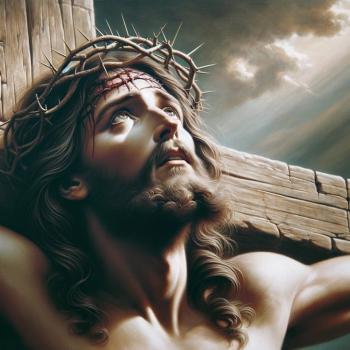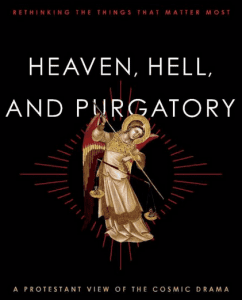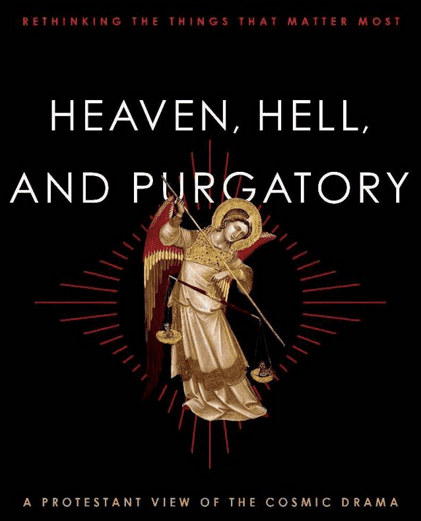 Roman Catholics have nearly always affirmed purgatory, though only rarely does a Catholic theologian (Rahner, perhaps Pope Benedict XVI) affirm purgatory as a second chance. (Second chance meaning an opportunity to respond to God in a saving manner after death.) A few Protestants have affirmed second chance purgatory. Jerry Walls, in his book Purgatory: The Logic of Total Transformation), mentions O.A. Curtis, P.T. Forsyth and Will Willimon.
Roman Catholics have nearly always affirmed purgatory, though only rarely does a Catholic theologian (Rahner, perhaps Pope Benedict XVI) affirm purgatory as a second chance. (Second chance meaning an opportunity to respond to God in a saving manner after death.) A few Protestants have affirmed second chance purgatory. Jerry Walls, in his book Purgatory: The Logic of Total Transformation), mentions O.A. Curtis, P.T. Forsyth and Will Willimon.
Jerry Walls modifyies a traditional (Catholic) view of purgatory by contending for purgatory as the opportunity for second chances; that is, one can be converted in purgatory. And he is a Wesleyan/Methodist, and this is the best study I’ve seen on this topic. Jerry Walls, in other words, is arguing in a rigorous philosophical and theological manner what Rob Bell presented in his Love Wins. I am unconvinced, am persuadable, and will offer brief support for my disagreement at the end of this post.
Purgatory raises these sorts of questions: How do we “do” theology? Why do so many Christians believe death is the end of opportunity? Is repentance after death that much different from repentance at death? What is the relationship of thinking all infants who die in infancy and purgatory as a second chance? Is there biblical support for second chances or for purgatory?
Here is one way Walls states his view: “Purgatory is the second chance to attain this sort of relationship [with God, with others] for those persons who were tardy in repentance, or complacent, or who pursued this relationship only halfheartedly in this life” (126).
At the heart of Walls’ proposal is a belief in “optimal grace,” namely, that God does whatever God can do to save all because God wills the salvation of all. In other words, everyone gets a full and equal chance to respond to God. [Walls explores counterfactuals — had someone lived longer, would that person have responded? He also explores whether or not Dante believed in optimal grace, and concludes he did not.] If God grants optimal grace, then damnation is only for those who persistently reject that grace.
Apart from a robust view of Calvinist election, the issue of “fairness” or “justice” enters this discussion. Walls believes not only in optimal grace but also in justice as fairness so that each person is morally culpable for a full perception of the salvation in Christ. If this can’t happen in this life, he infers, it can happen after death. [Calvinist Terry Tiessen, a friend of this blog, contends those who believe now in God will encounter Christ at death and can respond from a God-faith to a Christ-faith. He also thinks infants can exercise, at death, faith in Christ.]
Walls does not think second-chance purgatory minimizes life now but allows the hope of return. He allows that this means some could choose to leave the faith after death but, with others (like Thomas Talbott), thinks genuine love of God is so satisfying it is unlikely anyone would de-convert. He thinks this kind of purgatory is yet distinct from the last judgment. He also believes some will choose hell eternally.
Response:
1. How to do theology. The first issue for me when I read this study, which is as good as it gets, is that theology is to be done first and foremost by exploring biblical passages so that the Bible both teaches the substance of what is to be believed and sets the parameters. There is for me too much speculation here. Yes, the common Christian tradition is that infants will go to heaven, and there is some textual support for this and it seems reasonable to me, but I would not argue it is conclusive. Yes, I also believe in a wideness in God’s mercy, and I would argue this from righteous Gentiles in the Old Testament, and in texts like Cornelius in Acts 10-11, but these texts set parameters and they are not entirely clear to me. Yes, yes, yes… there are issues here but the big one is how to do theology and I’m a prima scriptura guy — so I want to see second-chance purgatory established in texts and, without such texts, then it is for me a matter of theological speculation. Walls is a good example of that. But there are to me a couple texts that make second-chance purgatory unlikely.
2. There is the uncrossable chasm in the parable of the rich man in Luke 16:19-31. Some like to say “that’s the details of the parable and it’s tricky,” and I don’t buy this kind of logic. The point for me is that Jesus apparently uses a typical Jewish cosmology (Hades as a temporary prison) to make a very important point. Maybe one doesn’t want to press Hades as a place in reality, but that’s not quite the same as saying the point — and let’s be clear that his point is “uncrossable finality” — isn’t being made. And the rich man presses for more and Jesus allows himself in the parable to press back harder by saying they’ve got Moses and the Prophets — that is, “God has spoken” — and he makes it undeniably clear that such revelation is sufficient.
Of course, it can be argued that such a parable would only apply to those who know Moses and the Prophets. Fair enough, but the words of Jesus have to be taken with utter seriousness: it’s not just “ancient cosmology, ignore it” but instead “he died, he had his chance, there’s no more chances.” On the prospect of what happens to those who have not heard — Walls does not explore 1 Peter 3 and I don’t know why more don’t. [A tough text, and I have written on it in my 1 Peter commentary, but one of the best readings is that this is a declaration of victory in Jesus’ ascension and not an opportunity for those who have died, but it could be read that way. Walls does not appeal here.]
Walls doesn’t see the logic of Luke 13:23-30 quite the same as I do, but that text to me is quite the warning both about how many will be saved and that those who appeal “after death” get no hearing. Thus, the famous at death then judgment text of Hebrews 9:27-28 may not say “no purgatory” but it does fit with this reading of the parables of Jesus. In spite of the many today who like the idea of open gates in Revelation 21-22 being open for new folks to enter, I find that reading strained: open gates is a symbol of security and there remains in Revelation the reality of the wicked being banned.
3. On optimal grace, I like his idea. I prefer, however, to think God’s grace in this life is enough and God will be merciful in judging all on the basis of what is just — including judging those who have not heard on the grounds of what they have heard. Instead of pushing optimal grace into the postmortem state, I’d see it in this life.
The big picture here: there is no evidence in the New Testament for second-chance purgatory; there is a slight possibility of postmortem opportunity for those who have not heard in 1 Peter 3 but I’m surprised how rarely that text is used in this discussion; and there are texts that seem to require readings that positively exclude second chances (not to say purgatory as well).














